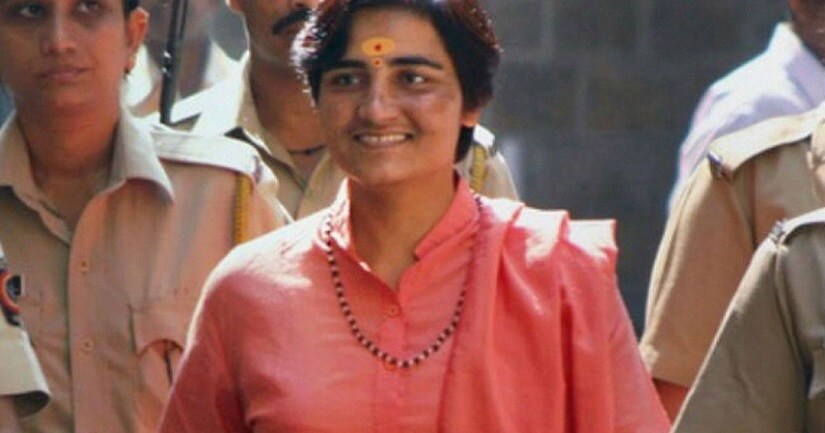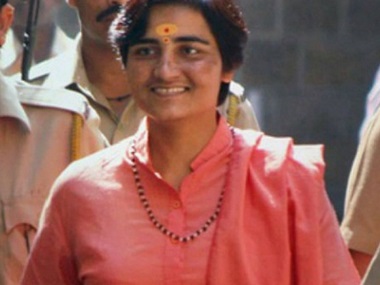Pragya Thakur, the 48-year-old ‘Sadhvi’ who had pleaded ‘infirm’ health in court during her trial for the Malegaon bomb blasts of 2008, became a member of the BJP a few days ago and was announced as the BJP candidate for the Bhopal seat in the 2019 elections. She will be pitted against the Congress’ Digvijay Singh on 12 May. Even in an electoral arena where candidates accused of rape and murder have been fielded by mainstream political parties, Pragya Thakur’s candidature is an explosive new development. She is yet to be cleared of charges of her involvement in an act of terror, a bomb blast that caused innocent people to die and suffer grievous injuries in Malegaon on 29 September 2008. A group of citizens — social workers, activists and lawyers — will be travelling to Bhopal from Pune under the leadership of retired Bombay High Court judge BG Kolse-Patil, to oppose her candidature. “The BJP may well be fielding her to project her as a victim of the ‘Hindu terror’ tag first used by the Congress, but no citizen or patriot with any love for their country could accept a terror accused like her to represent them,” says Anjum Inamdar, chairman of the Moolnivasi Muslim Manch, Pune. Inamdar is among those who will be travelling to Bhopal and says the group’s intention is to “make people aware of what they vote for if they cast their vote for her (Pragya Thakur)”. [caption id=“attachment_6479621” align=“alignnone” width=“825”]  Pragya Singh Thakur. File Photo[/caption] Planning to leave as soon as voting in Pune has concluded on 29 April, the group is going to question how Pragya Thakur can be considered a model worth following on any parameter — being Hindu, being a woman, or being a good citizen. Says Inamdar, “We are not lacking in exemplary women in our culture or history – be it Jijau, mother of Shivaji Maharaj, Savitribai Phule who first began educating girls, or Ahilyabai Holkar. We need to remind people of the sacrifices and selfless actions of such women. What a contrast from this person who is associated with the deaths of innocents.” “The evidence against Pragya Thakur is substantial,” says former Inspector General of Police SM Mushrif, the author of the book Who Killed Karkare?: The real face of terrorism in India (2009). “She was present in all four meetings of the group that conspired to carry out the Malegaon blasts — the first one in Bhopal, the second and third in Indore, and the fourth meeting at the dharamshala of the Mahakaleshwar temple at Ujjain. The meetings and their agenda have been described in the chargesheet — first, the venue was chosen for being a town densely populated with Muslims; second, the responsibilities were divided. While it was Lt Col Purohit’s task to get the RDX, Pragya Thakur offered the manpower. She introduced Ramchandra Kalsangra and Sandeep Dange as her trusted men, and it was decided they will receive the explosives at Pune. There is audio and video evidence of this available with the police, which has been recorded by the accused themselves and stored on their laptops. The case against her stands on solid ground.” Mushrif considers Hemant Karkare’s investigation of the case to have been top class – a thoroughly professional job that was not followed up later by other officers.
“If they had done their duty in the same manner, it would have been difficult for Pragya Thakur to be let off under MCOCA (Maharashtra Control of Organised Crime Act) in 2016,” Mushrif says.
Former Justice Kolse-Patil makes no bones about having been a fighter for an ‘RSS-Mukt Bharat’ for many decades. “In what way can the BJP say that Pragya Thakur symbolises Hindu ‘pratishtha’ (prestige)?” he asks. “Are Hindus to have no say in the matter? And calling her ‘Sadhvi’? Is she even deserving of the title? She had to be reprimanded by the judge for asking for a male to be her personal attendant in hospital,” he says. He is referring to then 39-year-old Pragya Thakur’s plea that her young male disciple Brahmagiri Anant help her in tasks like bathing and using the toilet, as reported in 2009. Kolse-Patil will be in Bhopal with his group by the end of April to lend his voice to citizens groups opposed to the candidature of Pragya Thakur. “I am a seasoned campaigner, but I cannot alone be risking life and limb opposing these people. We need to stand up and question how this is being done. When Mohan Bhagwat’s own people have said that he has taken money from the ISI and the RSS is behind the terror attacks in India, then how is it that people are still getting fooled by such conspiracies? Their conscience should prick them, as Hindus and as Indian citizens.” His remarks echo the findings of the sting operation carried out on Swami Aseemanand in a Rajasthan jail, in which he described the role of the RSS in several terror cases. _Suggested read: BJP fielding Sadhvi Pragya from Bhopal shows party's hardline fringe has become its mainstream Hindutva core_ In an election dominated by the worst levels of cynicism and manipulation, where the rhetoric of speeches has made reference to sections of our human population as ‘termites’ , and the country’s army and air force have been designated as ‘ Modi _ji ki sena_ ’, the BJP may find that the candidature of Pragya Thakur for Bhopal may yet prove to be the morsel most difficult for people to swallow. “There are unfortunately, still people around us who welcomed Pragya Thakur and Col. Purohit with a shower of rose petals when they came to the trial courts in Pune,” recalls Anjum Inamdar. We need to think very seriously now whether any ‘Hindu Rashtra’ that the Malegaon bombers hoped to usher in by 2024 will be a place worth living in, for us and our future generations.


)

)
)
)
)
)
)
)
)



